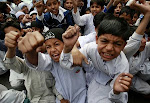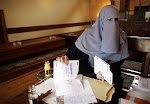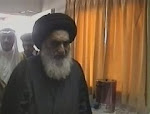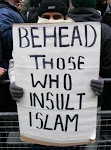Hizb ut-Tahrir is banned in numerous countries -- even by the prolific exporters of jihad in Saudi Arabia -- but legal in Australia and the U.K. Now, according to a spokesman for Britain's Home Office, "the group's status was being reassessed in light of the latest remarks but said that the decision to proscribe an organisation must be 'proportionate'."
Dr Imran Waheed, told followers of Hizb ut-Tahrir that there could be "no peace" with Israel and urged them to "fight in the way of Allah".
A leaflet distributed by the international wing of the organisation also called for Muslim countries to "eliminate the state of the Jews".
The remarks increased pressure on Jacqui Smith, the Home Secretary, to ban Hizb ut-Tahrir.
Patrick Mercer, the Tory chairman of the Commons Counter-Terrorism Subcommittee, said Dr Waheed's comments appeared to represent "incitement to violence" and accused the Government of performing a U-turn on an earlier commitment to ban it.
Speaking in Downing Street in August 2005, just a month after the London bombings, Mr Blair announced a wider crackdown on extremism, adding: "We will proscribe Hizb ut-Tahrir and the successor organisation of Al Mujahiroun."
The group, advocates the setting up of an Islamic "caliphate" or nation and describes itself as "unashamedly anti-Israel".
But it insists that it is exclusively non-violent and denies accusations of anti-Semitism.
Critics say that the group, which has thrived on university campuses, is a gateway to more extremist groups, something which it also vehemently denies.
Addressing a rally at Marble Arch in January following the Israeli military action in Gaza, Dr Waheed – the group's media adviser in Britain who was banned from entering Indonesia in 2007 – said that there was "no need for conferences, no need for treaties, no need for negotiations".
In the speech, highlighted by the think tank the Centre for Social Cohesion, he added: "There will be no peace and no negotiations with the illegitimate entity of Israel."
He went on: "There is only one solution to the occupation of Muslim lands, one solution to the cries of the widows and the orphans, one solution to avenge the death of the elderly and the children ... fight in the way of Allah those who fight you. Al-Jihad."
A leaflet available on the group's international website, dated Jan 19 2009, criticises the governments of Muslim countries which have attended peace summits as "shameful".
"Instead, it was their duty to eliminate the state of Jews that has usurped Palestine," it added.
A spokesman for the Home Office said that the group's status was being reassessed in light of the latest remarks but said that the decision to proscribe an organisation must be "proportionate"....
And yet the UK still allows people like this into their country.
12 years ago





















